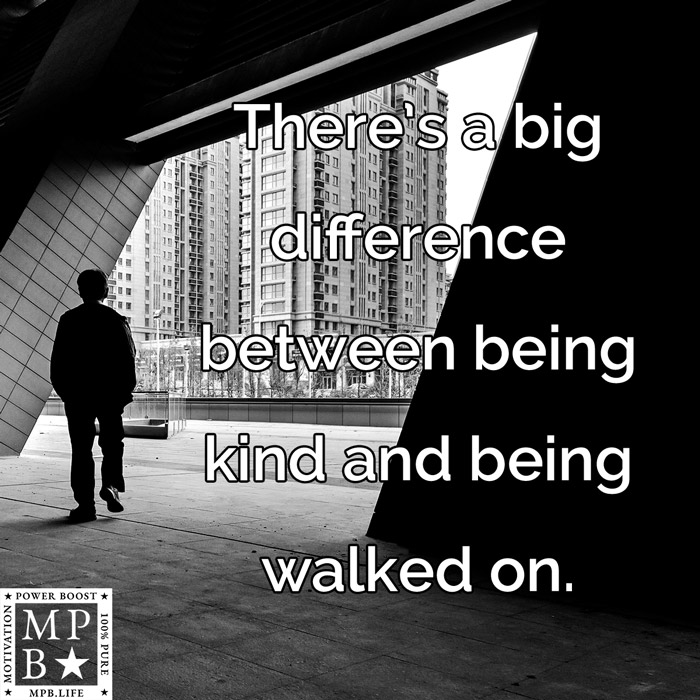
There’s A Big Difference Between Being Kind And Being Walked On Graphic © motivationpowerboost.com
There’s a big difference
between being kind and
being walked on.
Navigating the Delicate Balance: Kindness vs. Being Taken Advantage Of
Kindness, a virtue that has been celebrated and cherished throughout history, is often seen as the cornerstone of a compassionate society. It is the act of extending empathy, understanding, and support to others, even when it may not be reciprocated. However, in our pursuit of being kind, we must also be mindful of the fine line that separates genuine kindness from allowing ourselves to be walked on.
The quote, “There’s a big difference between being kind and being walked on,” serves as a powerful reminder that while kindness is essential, it should not come at the cost of our own well-being and self-respect. It is crucial to recognize that being kind does not mean sacrificing our boundaries, values, or dignity.
True kindness stems from a place of inner strength and self-awareness. It is the ability to offer support and understanding to others while simultaneously maintaining a healthy sense of self. When we are secure in our own worth and value, we can extend kindness without the fear of being exploited or taken for granted.
On the other hand, being walked on occurs when we allow others to consistently disregard our needs, feelings, and boundaries. It happens when we prioritize the comfort and convenience of others over our own well-being, often out of a misplaced sense of obligation or a desire to avoid conflict.
To strike a balance between kindness and self-preservation, we must learn to set clear boundaries and communicate them effectively. This involves being assertive in expressing our needs and expectations, while also being open to constructive dialogue and compromise. It requires the courage to say “no” when necessary, even if it may disappoint others in the short term.
Moreover, it is important to recognize that true kindness is not a one-way street. It is a reciprocal exchange that involves both giving and receiving. When we consistently extend kindness without receiving it in return, it can lead to feelings of resentment, burnout, and emotional exhaustion.
To cultivate a healthy balance, we must surround ourselves with individuals who value and respect our kindness, rather than exploit it. We should seek out relationships and environments that foster mutual understanding, support, and growth.
In conclusion, while kindness is a noble and essential trait, it is equally important to protect ourselves from being walked on. By setting healthy boundaries, communicating effectively, and valuing our own well-being, we can navigate the delicate balance between extending compassion and preserving our sense of self. Remember, true kindness begins with being kind to ourselves, so that we can authentically and sustainably extend that kindness to others.
Finding the Balance: Practical Strategies for Maintaining Boundaries
While understanding the importance of the balance between kindness and self-preservation is crucial, putting it into practice can be challenging. Here are some practical strategies to help navigate this delicate equilibrium:
1. Self-Awareness: Cultivate a deep understanding of your own values, needs, and limits. Reflect on situations where you felt taken advantage of or compromised your boundaries, and learn from those experiences. This self-awareness will empower you to make conscious choices that align with your authentic self.
2. Assertive Communication: Learn to express your thoughts, feelings, and boundaries in a clear, respectful manner. Effective communication involves active listening, empathy, and the ability to articulate your perspectives without aggression or passive-aggression. Practice stating your needs firmly yet kindly, and be open to finding mutually beneficial solutions.
3. Prioritize Self-Care: Taking care of your physical, emotional, and mental well-being is essential for maintaining healthy boundaries. Make time for activities that nourish and rejuvenate you, whether it’s exercise, meditation, pursuing hobbies, or spending time with supportive loved ones. When you prioritize self-care, you’ll be better equipped to extend kindness without depleting your own resources.
4. Identify and Avoid Toxic Relationships: Recognize the signs of toxic or exploitative relationships, where kindness is consistently met with disrespect, manipulation, or a lack of reciprocity. While it’s admirable to try to help others, sometimes the healthiest choice is to disengage from situations or individuals that consistently undermine your boundaries.
5. Seek Support: Building a supportive network of people who understand and respect your boundaries can be invaluable. Surround yourself with individuals who encourage your growth, validate your experiences, and hold you accountable in a compassionate manner. This support system can provide guidance, perspective, and the reassurance that you’re not alone in your journey.
Remember, maintaining boundaries is an ongoing process that requires constant awareness, reflection, and adjustment. It’s a journey of self-discovery and self-respect, where kindness and self-preservation coexist in a harmonious balance.
Related Inspirational Quotes
“Meekness is not weakness, it is strength under control.” – Booker T. Washington
“Never be bullied into silence. Never allow yourself to be made a victim. Accept no one’s definition of your life; define yourself.” – Harvey Fierstein
“Do not confuse my good manners with my silence. Silence is the language of fools.” – Gram Parsons
“The challenge is always to keep the strong from becoming brutal and the weak from becoming meek.” – Danny Hillis
“Let insults pass over like clouds before the glorious sun.” – Hazrat Inayat Khan
